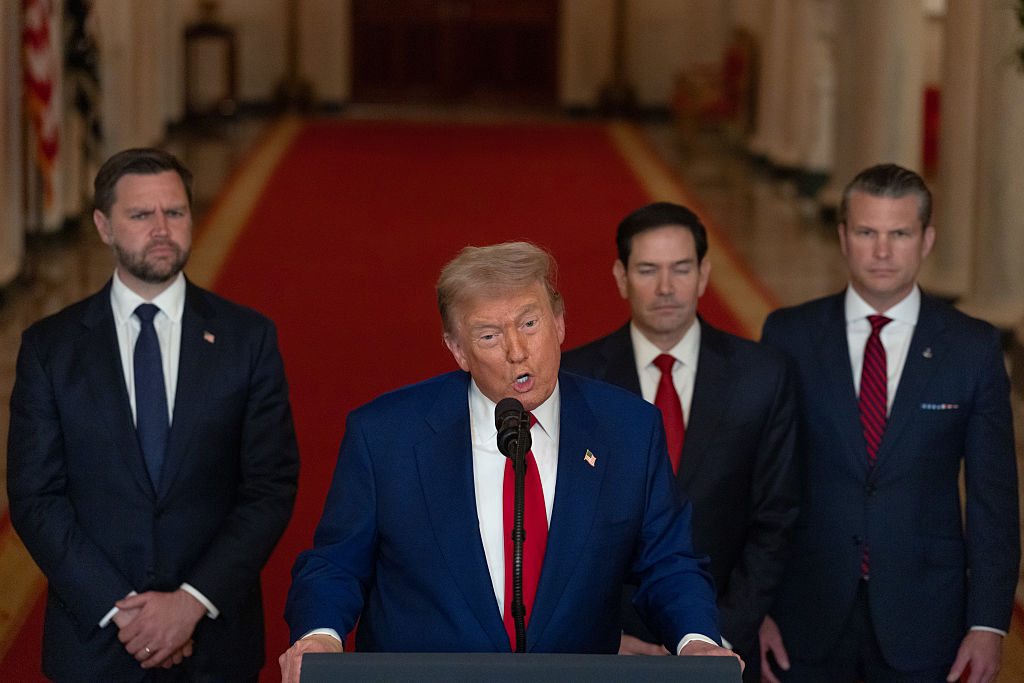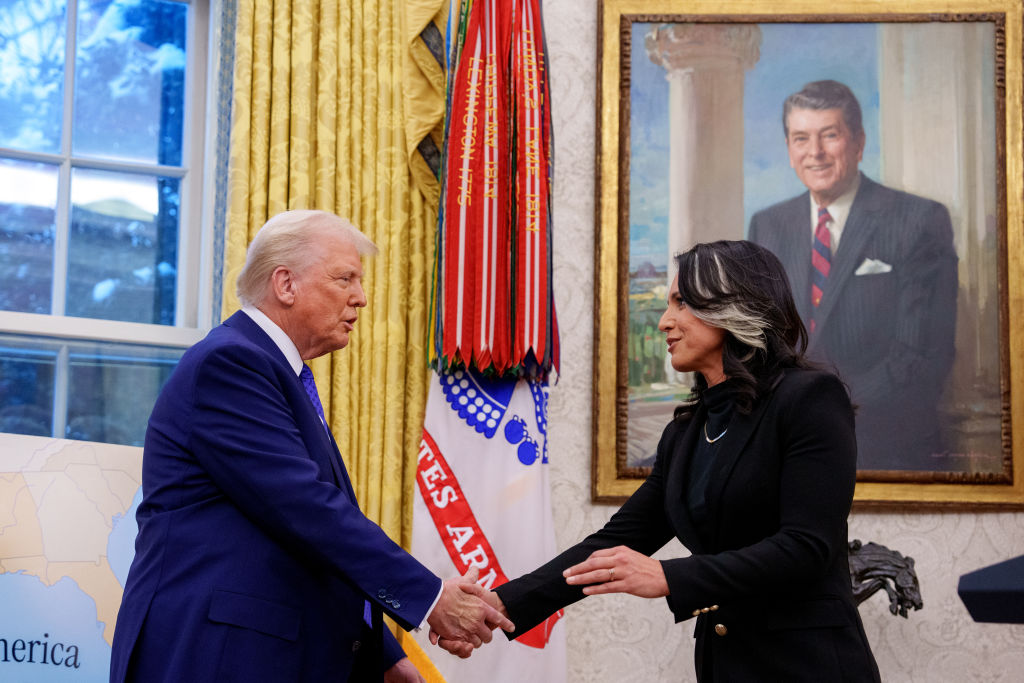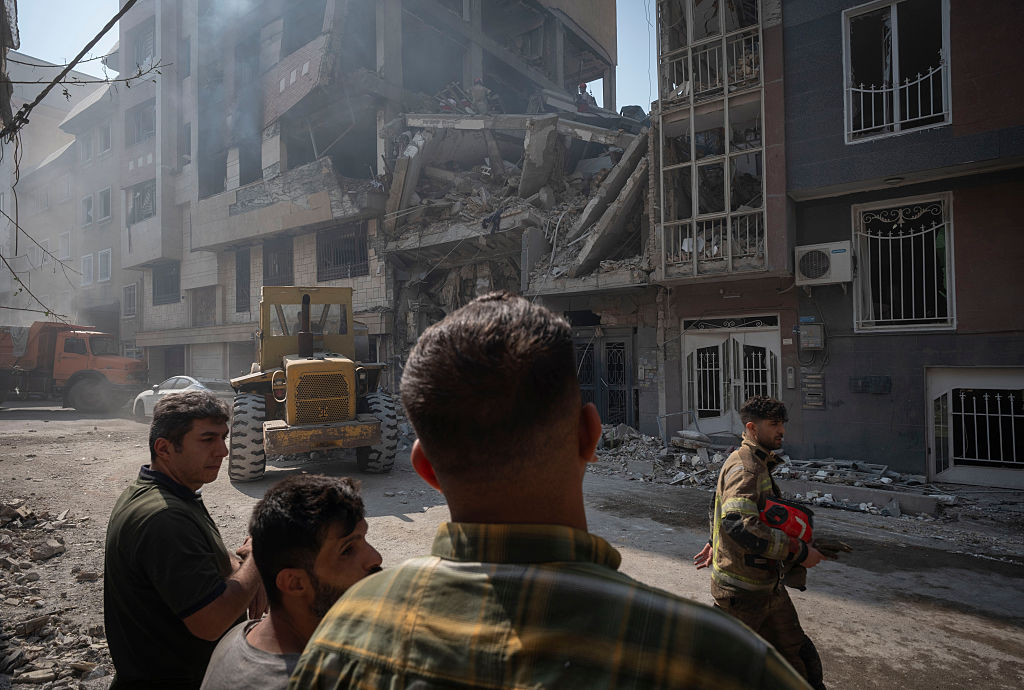Iran
Source: HAYI / Getty
After initially stating to mull the decision for a time, President Donald Trump ordered the bombing of three nuclear sites in Iran on Saturday (June 21), which has escalated the conflict to unprecedented levels. Top Democratic Party officials say that they were not briefed on President Trump’s actions, and a national address from the former business mogul claimed a total annihilation of Iran’s nuclear weapons production capabilities.
As seen in an NBC News report, President Trump boasted of the bombing of three sites in Iran, Fordo, Natanz, and Isfahan, which the administration framed as the epicenter of Iran’s nuclear weapons production. This comes as the two countries are locked in a long-distance skirmish that has left over 400 dead in Iran and over 24 dead in Israel.
“We have completed our very successful attack on the three Nuclear sites in Iran, including Fordow, Natanz, and Esfahan,” Trump wrote on Truth Social shortly after the attack. The move garnered praise from several GOP officials, including Speaker Mike Johnson, who stated that Congress would have taken too long to give its approval to Trump.
Democratic Party Sen. John Fetterman praised Trump’s actions, writing on X, “Iran is the world’s leading sponsor of terrorism and cannot have nuclear capabilities. I’m grateful for and salute the finest military in the world.”
Fetterman’s stance differs from those of his party, many of whom said that they were left out of briefing talks ahead of the strikes.
Rep. Thomas Massie, a Republican congressman out of Kentucky, called Trump’s actions “unconstitutional” via social media.
Sen. Tim Kaine of Virginia wrote on X of the bombing, “The American public is overwhelmingly opposed to the U.S. waging war on Iran. And the Israeli Foreign Minister admitted yesterday that Israeli bombing had set the Iranian nuclear program back ‘at least 2 or 3 years’. So what made Trump recklessly decide to rush and bomb today? Horrible judgment. I will push for all Senators to vote on whether they are for this third idiotic Middle East war.”
House Minority Leader Rep. Hakeem Jeffries of New York shared in a statement, “President Trump misled the country about his intentions, failed to seek congressional authorization for the use of military force and risks American entanglement in a potentially disastrous war in the Middle East.”
United Nations Secretary-General António Guterres also took to X to give a statement regarding the strikes:
I am gravely alarmed by the use of force by the United States against Iran today. This is a dangerous escalation in a region already on the edge – and a direct threat to international peace and security.
There is a growing risk that this conflict could rapidly get out of control – with catastrophic consequences for civilians, the region, and the world.
I call on Member States to de-escalate and to uphold their obligations under the @UN
Charter and other rules of international law.
At this perilous hour, it is critical to avoid a spiral of chaos.
Source: Pool / Getty
Late Saturday night, Trump was flanked by Vice President JD Vance, Defense Secretary Jim Hegseth, and State Secretary Marco Rubio, praising the efforts of the military strike.
“I want to thank the Israeli military for the wonderful job they’ve done, and most importantly, I want to congratulate the great American patriots who flew those magnificent machines tonight and all of the United States military on an operation the likes of which the world has not seen in many, many decades,” President Trump said.
On X, the reaction to the Iran bombing and the fear of retaliation cast gloom across the social media network. We’ve got reactions below.
—
Photo: Getty
HipHopWired Featured Video
CLOSE
President Donald Trump and the Director of National Intelligence, Tulsi Gabbard, once appeared to be in lockstep when it came to foreign policy. However, there are rumblings in Washington that Tulsi Gabbard’s recent actions on social media have angered President Trump, showing a potential fracture within the administration.
Politico published a report highlighting the tensions between Gabbard and Trump that came in the wake of the rising conflict between Iran and Israel. On June 10, Gabbard took to X and shared an ominous video that displayed to viewers that the “political elite” and “warmongers” were recklessly at odds and suggested that Earth is “on the brink of nuclear annihilation.”
The outlet added in its report that Trump saw the video, which was not approved by the administration, and told others at the White House that she went outside the lines regarding messaging around the Iran and Israel conflict. Trump met last week with Israeli officials who sought the United States’ support in its assault on Iran. It was also stated that Trump reportedly thought Gabbard was trying to steer him away from working with Israel on their recent offensive maneuvers.
“I don’t think he dislikes Tulsi as a person. But certainly the video made him not super hot on her, and he doesn’t like it when people are off message,” a source close to Trump told Politico.
The rumors of disdain appeared somewhat true after Trump spoke to a throng of reporters aboard Air Force One. When asked about Gabbard’s comments made in March that Iran was not developing a nuclear weapon, Trump made a stern statement.
“I don’t care what she said,” Trump said on Tuesday (June 17). “I think they were very close to having one.”
Tulsi Gabbard spoke to reporters as well yesterday, claiming that she and President Trump were in agreement about the situation unfolding in Iran. That said, outside observers are seeing this potential split as a troublesome thing for the Trump administration.
We’ve got reactions from X regarding the situation below.
—
Photo: Andrew Harnik / Getty
HipHopWired Featured Video
CLOSE
Israel carried out a massive military strike that was aimed at taking out Iran’s nuclear and top Iranian military officials. Iran has retaliated against Israel, with the world watching to see if this will escalate into an all-out war between the two nations.
Tensions between Israel and Iran date back to the South Lebanon conflict in the mid-1980s and have persisted at varying levels since. This latest offensive from the IDF and Mossad was aimed at taking down Iranian nuclear, missile, and military sites, and Israeli officials have reportedly taken out an Islamic Revolutionary Guards Corps (IRGC) leader along with two other top commanders, which Iranian Supreme Leader Ayatollah Ali Khamenei confirmed.
As reported by several outlets, including CNN, Reuters, and The Hill, the attack comes after months of negotiation between the United States and Iran to complete a new nuclear deal. While most major nations have largely agreed to scale down nuclear weapons production, the International Atomic Energy Agency (IAEA) discovered that Iran was fast-tracking the enrichment of uranium, which set off warning signals to Israeli leaders.
Iran has launched over 200 drones in retaliation against the overnight Israeli strikes, setting the stage for more military offensives from both nations. President Donald Trump told the Wall Street Journal that he was aware of Prime Minister Benjamin Netanyahu’s plans, with Secretary of State Marco Rubio stating that the United States had no involvement in the strikes.
“Tonight, Israel took unilateral action against Iran. We are not involved in strikes against Iran, and our top priority is protecting American forces in the region,” Rubio said Thursday night (June 12).
“Israel advised us that they believe this action was necessary for its self-defense. President Trump and the Administration have taken all necessary steps to protect our forces and remain in close contact with our regional partners. Let me be clear: Iran should not target U.S. interests or personnel,” Rubio continued.
On X, formerly Twitter, most are pointing out the impetus of a large-scale war between Israel and Iran, while also aiming barbs at President Trump over his foreign policy aims. We’ve got those reactions below.
—
Photo: Getty
HipHopWired Featured Video
CLOSE
HipHopWired Featured Video
Source: Robert DEYRAIL / Getty
An Iranian court issued a death sentence to a popular rapper who was jailed for over a year after backing nationwide protests.
On Wednesday (April 24), rapper Toomaj Salehi was sentenced to death by a court in Iran for his support of protests that swept through the country two years ago, according to his lawyer. “Branch 1 of Isfahan Revolutionary Court… sentenced Toomaj Salehi to death on the charge of corruption on Earth,” Salem’s lawyer Amir Raisian said in a statement, adding “that in an unprecedented move, emphasized its independence and did not implement the Supreme Court’s ruling”. Salehi had been imprisoned in Isfahan in solitary confinement after reportedly being violently rearrested by Iranian police last year for 252 days, according to a report from the Office of the UN High Commissioner for Human Rights (OHCHR).
The rapper has been highly critical of the Revolutionary Government in the past and was initially arrested in October 2022 for “assistance in sedition, assembly and collusion, propaganda against the system and calling for riots” after protests over the death in police custody of Mahsa Amini the month before. Amini, 22, was an Iranian-Kurdish woman who had been detained for allegedly flouting the Islamic Republic’s strict dress code for women. Raisian stated that “We will certainly appeal against the sentence”. Iranian state media reported that Salehi’s sentence would be subject to a reduction by a pardoning committee upon appeal. Kurdish-Iranian rapper Saman Yasin was also detained by Iranian police and given a prison sentence after the protests.
The news prompted multiple expressions of outrage. “We strongly condemn Toomaj Salehi’s death sentence and the five-year sentence for Kurdish-Iranian rapper Saman Yasin. We call for their immediate release,” the United States’ Office of the Special Envoy for Iran said in a post on X, formerly Twitter. “These are the latest examples of the regime’s brutal abuse of its own citizens, disregard for human rights, and fear of the democratic change the Iranian people seek.”
Ye-One Rhie, a member of the German Parliament and Salehi’s sponsor, also called for Salehi’s release. “It is still completely unclear how this verdict came about,” she posted on X on Wednesday. “It is unbelievable how irresponsibly and arbitrarily the Iranian regime treats defendants. It is impossible to recognize the rule of law in the chaos of the courts in charge.”
HipHopWired Featured Video
Source: Anadolu / Getty
A tech watchdog group is placing high scrutiny on X, formerly Twitter, alleging that it’s letting terror groups pay for verified accounts.
A report from the Tech Transparency Project (TTP) on Wednesday (Feb. 14), claimed that it discovered that 28 premium subscription accounts on X, formerly Twitter, under owner Elon Musk’s verification plan were given to groups that are currently under sanction by the United States including designated terror groups such as the Hezbollah organization. The subscriptions, identified by a blue check for verification, cost $8 a month and offer more promotion by the platform’s algorithm. Before Musk acquired the platform, accounts with a blue check were primarily for celebrities, companies and other notable figures.
The report detailed all of the groups and individuals involved beginning with Hassan Nasrallah, the leader of Hezbollah whose account has over 93,000 followers. It was listed as “ID verified,” which meant that X received government certification from Nasrallah. Also included was an account belonging to Ansarallah, the Yemeni militia group more commonly known as the Houthis. An account belonging to Iran’s Press TV state-run news outlet and one belonging to Russia’s Tinkoff Bank was found to have gold checks, which denote verified organizations. The cost for those subscriptions is $1,000 a month.
“We were surprised to find that X was providing premium services to a wide range of groups the U.S. has sanctioned for terrorism and other activities that harm its national security,” said Katie Paul, the director of the Tech Transparency Project to a reporter. “It’s yet another sign that X has lost control of its platform.” In their report, the TTP stated that 10 of the 28 accounts were paying to ensure that they kept “legacy” checkmarks that they had earlier. There is uncertainty as to how these groups and individuals avoided the rules to pay for their accounts according to X’s guidelines. Musk did let go of 80% of the staff at X since acquiring the platform in October 2022.
X released a statement later on that day refuting the claims from the TTP report. “Several of the accounts listed in the Tech Transparency Report are not directly named on sanction lists, while some others may have visible account check marks without receiving any services that would be subject to sanctions,” the statement read. Several of the mentioned accounts did have their check marks removed before the statement was posted.
Coldplay‘s version of “Baraye,” a soft-spoken Iranian revolutionary anthem that recently landed its singer in state detention, was not just intended for the crowd at the EstadioMâs Monumental in Buenos Aires last month.
Amid weeks of street protests in Iran over the Islamic Republic’s policing of dissent and violent treatment of young women, the stadium singalong went viral, landing in worldwide news reports and generating hundreds of thousands of YouTube views.
Shervin Hajipour crowd sourced “Baraye” with lyrics he collected from tweets from Iranian protesters. The hymn is “like a Joan Baez song, not a Rage Against the Machine song,” says Sam Zarifi, the Tehran-born secretary general of the human-rights group International Commission of Jurists.
It quickly became an anthem for the protest movement, which was triggered when police arrested a 22-year-old Kurdish woman, Mahsa Amini, for allegedly wearing her state-mandated headscarf not tightly enough. Three days later, Amini died at a police station — beaten to death, according to her family, although the government cited a heart attack — leading to the mass street protests.
Since her death on Sept. 16, street protests have resulted in dozens of deaths and hundreds of arrests, according to news reports.
“The constant refrain of the protesters right now is ‘be our voice,’” says Zarifi. “What they really want is to not be forgotten. Attention must be paid.”
Hajipour, a 25-year-old pop artist from northern Iran, posted his version of “Baraye” on social media on Sept. 28. It includes the verse “because we want to be free to dance outside in the streets/because we feel terror when it’s time to kiss.” The track hit 40 million Instagram views in one day, according to the Washington Post and others. Since then, it has streamed 3.2 million times globally, according to Luminate, which doesn’t receive data on streams within Iran. The track has also sold 2,500 downloads, hitting No. 4 on Billboard‘s World Digital Song Sales chart last month.
The Iranian government quickly arrested Hajipour and the song vanished from his Instagram. But it was too late to prevent “Baraye” from turning into a worldwide anthem supporting the protesters. The Coldplay version in Argentina was a duet with a guest, Iranian actress Golshifteh Farahani, with verses sung in Farsi. Last month, Iran released Hajipour from detention, and he appeared in an Instagram video to say “Baraye” contained no links to a “movement or organization outside the country.”
The song’s worldwide attention is “huge,” says Zarifi, an American living in Switzerland who grew up in Iran listening to rock ‘n’ roll on headphones to avoid punishment from a government opposed to western music. He cites Baez’ 2009 version of “We Shall Overcome,” including a verse sung in Persian, as particularly inspirational for Iranians at the time.
“Nobody saw it, but it meant a lot,” Zarifi says. “This protest is absolutely the desire of a generation of Iranian kids just to be part of the regular world — if you see some of the people who were killed, they’re just kids who want to do TikTok videos and listen to music on the street. They’re being bullied by backward-looking old mullahs.”
Iranian protests have a history of music and verse going back centuries to the 13th-century Persian poet Hafez, who commented on political instability and religious hypocrisy, according to New Lines magazine. More recently, Iranian leftists retrofitted Chilean singer-songwriter Victor Jara‘s anthem “El Pueblo Unido” into an inspirational theme for Iran’s 1979 revolution, according to Zarifi, who says that the revolutionaries gave little thought to the repressive regime that would follow Mohammad Reza Shah, Iran’s last Shah (king).
Negar Mottahedeh, a Duke University literature professor who teaches gender and feminist studies, says “Baraye,” which translates to “because of” or “for” in Persian, is “wholly new and grounded in the conditions, desires and demands of the present.” She adds that the song is both relevant and flexible, recently landing in video versions by English-language interpreters, a Dutch dance troupe, worldwide animators and Swedish Eurovision stars.
“It’s a very gentle and soft song, but it’s full of mourning and grief,” says Mottahedeh. “Someone asked me about the raging anger that is beneath that — of course it’s there, but there is also a sadness about this moment.”
Or as Coldplay’s Chris Martin told the crowd in Argentina on Oct. 29: “Young women and young people are fighting for their freedom — for the right to be themselves.” Then he added, “You may not know this song, but we’re going to give it everything.”
Chris Martin of Coldplay performs at Estadio Mâs Monumental Antonio Vespucio Liberti on October 25, 2022 in Buenos Aires, Argentina.
Santiago Bluguermann/GI
-
Pages

 State Champ Radio
State Champ Radio 






